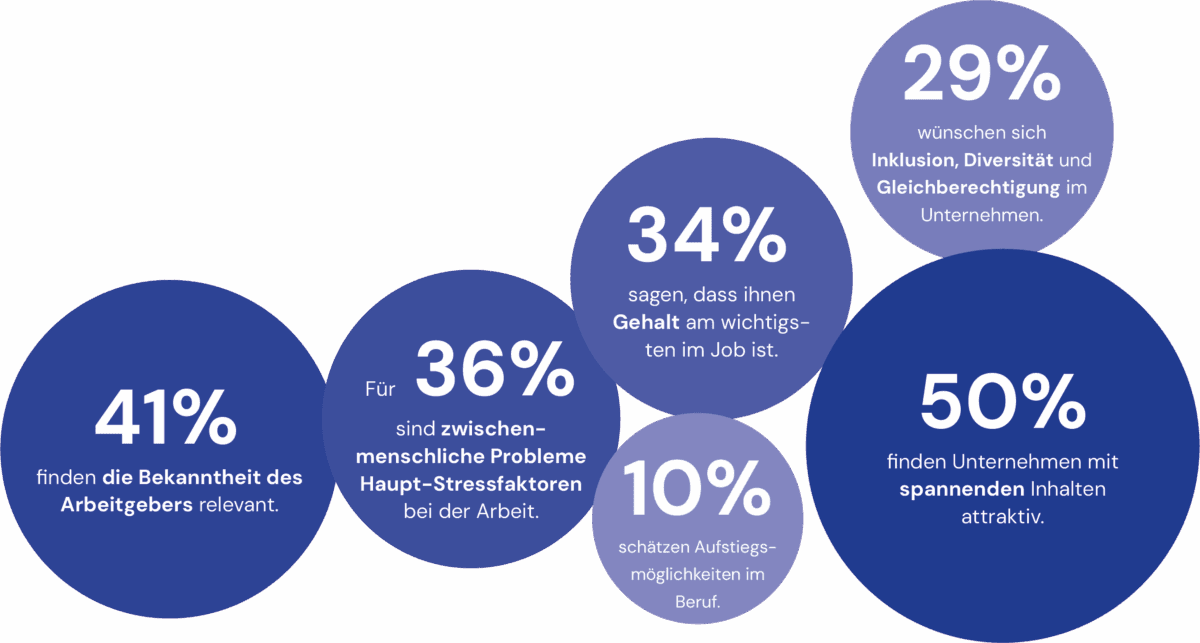Generation Z—Money Before Work-Life Balance


Gen Z is on everyone's lips, especially in the work context. They are hardly resilient, have no interest in a career, too much self-confidence and a high salary expectation - these are the prejudices. Is this tenable? A recent study by Factorial, a technology company that offers software for personnel management, shows a somewhat more differentiated picture. What is particularly striking is that salary is once again clearly at the center of attention - especially among the younger generation. The HR Study 2025 provides clear answers to the question of what companies will have to prepare for in the future.
Despite the buzz surrounding work-life balance, an attractive salary remains the key factor when choosing a job. Almost a third of respondents (29.4 percent) cited salary as the decisive criterion. Among 18- to 24-year-olds, this proportion is even higher, at 34 percent. The study thus refutes stereotypes about Generation Z being supposedly leisure-oriented. For human resources departments, it is clear that competitive salary structures are indispensable, especially when it comes to recruiting young talent.
The nine-to-five workday is a thing of the past
Contrary to what many assume, flexible working hours are more important than working from home. More than 30 percent of those surveyed would like to have more autonomy in organizing their time. It is noteworthy that men prefer the four-day week more often than average (28 percent), while women are more in favor of working from home options (24.4 percent). Companies should take these preferences into account and not seek one-size-fits-all solutions.
Stress remains a constant problem. Three main sources of stress dominate the results of the current survey: first, high workloads, which 39 percent of respondents perceive as stressful. This is followed by communication deficits, with 32 percent, and overtime, which 30 percent of respondents mention as a stress factor. It is interesting to note that the perception of these stressors varies by gender: women find overtime particularly stressful, while men are more likely to suffer from time pressure.

Gen Z under the microscope: What is important to the younger generation in the workplace? The study shows mixed results for 18 to 24-year-olds. 41 percent consider the employer's reputation to be important. For 36 percent, interpersonal problems are the biggest stress factors at work. Thirty-four percent say that the salary is the most important factor for them. Ten percent value opportunities for advancement in their profession. Twenty-nine percent want inclusion, diversity, and equality in the company. Fifty percent find it attractive when a company has interesting content.
Corporate culture unites
Companies can address these challenges with structured measures. These include effective workload management that includes regular capacity planning and transparent task allocation. A poor working environment is one of the most common reasons for resignation, after salary. Appreciation, team cohesion, and respectful communication are more important than flat hierarchies.
In addition, 40 percent of respondents consider their employer's ethical orientation to be important. Generation Z, in particular, demands more: diversity, inclusion, and equity are increasingly taking center stage. The study shows that additional monetary benefits, such as bonuses (34 percent) and company pension plans (26 percent), are significantly more important than benefits in kind or events. It is worth making a distinction: Generation Z wants specific further education opportunities that promote both professional development and personal fulfillment.
Substance over superficiality
Nowadays, a well-known company logo is no longer enough. Forty percent of those surveyed want corporate values to match their personal convictions. For human resources departments, this means that employer branding must be based on substantial, credible, and transparent values, rather than solely on image.
Targeting generations
The study makes it clear that while Generation Z focuses primarily on financial security, older generations strive more for fulfillment and work-life balance. Generation X (people aged 45 to 50) is primarily focused on meaningful activities (70 percent) and achieving a work-life balance (61 percent). Modern human resources management must respond to this situation with specific offerings for each age group.
Conclusion
Five key lessons learned
- Think strategically about salary:
Develop clear, fair, and transparent remuneration models. - Offer differentiated flexibility:
Individual solutions instead of rigid models. - Actively manage stress:
Focus on prevention and resource planning. - Check benefits for relevance:
Investments in sense and security are worthwhile. - Living values visibly:
Authenticity beats familiarity.






